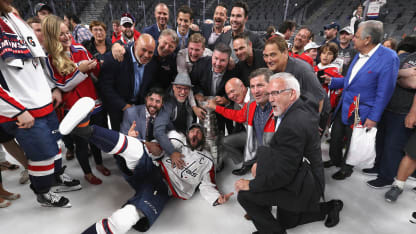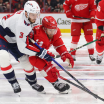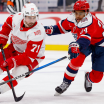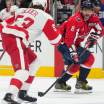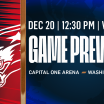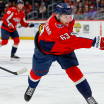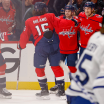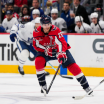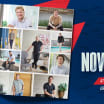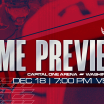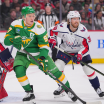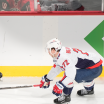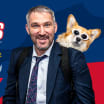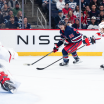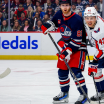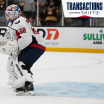This is the 15th season that Washington hockey and sports fans have been able to watch Alex Ovechkin perform his unique brand of magic for the Capitals. Playing more than a thousand games in a Caps sweater and now closing in on 700 career goals, Ovechkin can be seen as a Halley's Comet of the District sports scene. Athletes of his ilk are rare, and those of us who have been fortunate enough to witness the bulk of his career here won't forget his many on ice exploits.
Early Times of The Great Eight
An oral history of the early years of the Alex Ovechkin era in DC
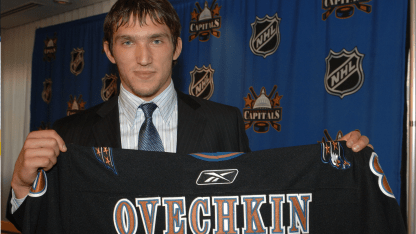
By
Mike Vogel
WashingtonCaps.com
Those exploits are ongoing, too. He's not finished yet, but Father Time remains undefeated, and history tells us that The Great Eight has played more games in the league than he is going to play in the seasons ahead. His impact on hockey in this town and on the sporting landscape in the District is immeasurable, and most of us are extremely unlikely to see anything approaching it again in our lifetimes. Appreciate him, savor his greatness, and revel in his feats now, for they won't last forever. Nothing does.
A decade and a half into his tenure here, the Caps are perennial contenders for the Stanley Cup, they routinely play to large, loud and raucous crowds, and the footprint of the game here is much larger than it was before he debuted in the District on Oct. 5, 2005. The Capitals have reached the Stanley Cup playoffs in 10 of the last 11 seasons, and they finally hoisted the coveted chalice for the first time in franchise history on June 7, 2018 in Las Vegas.
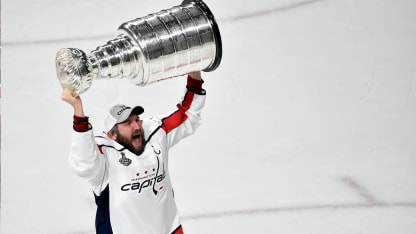
With all the sellout crowds and the many playoff games and home ice victories on F St. over the last 15 years, it's sometimes difficult to remember what hockey life was like in this area prior to Ovechkin's fortuitous arrival in town. With that in mind, we spent some time talking to a host of folks who do remember what it was like in DC before Ovechkin arrived on the scene. These are their recollections of what life was like in those days, from the trying 2003-04 season to the lucky bounce of the lottery balls that brought Ovi to DC, to the first couple of seasons of promise, to the 2007-08 season that augured in the current era of Caps hockey, and their thoughts on watching one of the best players this game has ever known mature as a player, a person, and a captain over these last 15 years.
Here it is, an oral history of the early years of Ovechkin in DC.
I - Rock Bottom
The Caps entered the 2003-04 season with a payroll of $51.1 million - ninth highest among the league's 30 teams - a figure that was up significantly from the $31.4 million spent to put the Stanley Cup finalist 1997-98 team on the ice half a decade earlier. The '03-04 Caps were coming off a disappointing first-round playoff exit at the hands of the Tampa Bay Lightning in the spring of 2003.
After winning the first two games of that 2003 first-round series on the road, the Caps dropped four straight to the Bolts, exiting the postseason on Easter Sunday when they lost in triple-overtime. Martin St. Louis scored a power-play goal after the Caps were deemed guilty of having too many men on the ice.
That aging, high payroll team won its season opener against the Islanders, but went winless in eight straight after that. By the time the Caps won their second game of the season on Halloween night to improve to 2-7-1-0, the purge had already started with the trade of team captain Steve Konowalchuk to Colorado.
OLIE KOLZIG(Caps goaltender, 1989-2008)
It was a very frustrating season. We made the playoffs the year before and we were expecting to have a pretty good hockey team. And we came out that next year and just never clicked. Whether it was the coaching, whether it was some of the personnel on the team, or whatever, it just wasn't working. And so management made the decision to clean house. Not to say that we were going to tank, because I don't think that's possible to do in the game of hockey, but they wanted to give themselves better odds I guess of maybe being able to get Ovi. Not everybody knew or had heard about how special he was and the things he was doing over in Russia. But being part of that team, I didn't really look at what was coming down the pike. It wasn't fun losing every night. It wasn't fun losing teammates to trades. So at that point, it was pretty bleak.
DICK PATRICK (Caps president, 1982-current)
There was a plan in place. The team was good; we had a lot of good players. But it didn't appear that it was going be - with the competition of the time - good enough to win a Cup. So we had some talks about how to get better. George McPhee was the manager, and George and Ted and I talked a lot. And when that year started with us not doing well, we said, 'Well maybe this is the time.' Also looming was the lockout, and it looked unlikely that we would be able to get a peaceful labor agreement, and we could well be facing the loss of part or all of the season, and it turned out to be all of the season. So we made the decision to start trading our best assets, really, guys like Sergei Gonchar, Robert Lang, Peter Bondra and Jaromir Jagr to try to rebuild.
DAINIUS ZUBRUS (Caps forward, 2001-07)
Obviously it didn't go the way we had planned, because we had some real good players. But it also felt a little bit like it was preparation for a lockout, right? The big guys with the bigger salaries were moved, and it did feel like it was maybe going to be a long lockout, and we weren't sure what the outcome was going to be. And it kind of felt like the organization was ready for that with a rebuild idea. That's how I remember that season.
BRIAN WILLSIE(Caps forward, 2003-06, 2010-11)
To start the '03-04 season, there were some expectations there. We had some good players. Jagr was still there, and Bondra and Lang. So I don't think the expectation was to dismantle, but it just started to kind of go off the rails. We changed coaches, and George saw it coming, and was proactive in rebuilding rather than waiting too long. There were expectations at the start of that season that we would do well, but when it started to go sideways and you could see what was happening - and with the real high end players available in the upcoming draft - the rebuild started.
When it got toward the end, it proved to be an opportunity for a lot of young guys. It gave me a full-time NHL job and allowed me to establish myself in the league, and it did for many others. But yeah, it sucked, the losing. I think every week we traded away one of our leading scorers.
By the end of it, we were patching together a lineup with waiver pickups and some of the middle players from [AHL] Portland, because they were pushing to make the playoffs, and we didn't want to take their better players.
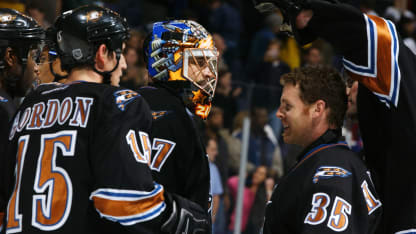
II - When I Win The Lottery
With a 4-3 road loss to the Pens in Pittsburgh on April 4, 2004, Washington finished the 2003-04 season with the third-worst record in the league, a point ahead of Pittsburgh, which finished 30th among the 30 teams. Two days later came the NHL draft lottery. In those days, the draft lottery was not a television event like it is now.
TED LEONSIS (majority owner of the Capitals, 1999-current)
I remember that vividly. I was president and vice chairman of America Online. I was at my office in Northern Virginia, and I was in a meeting with a bunch of people. And my assistant came in, and said, "Gary Bettman is on the phone." And I said, "Just tell him I will call him back." And then she came right back and she said, "No, he needs to speak to you." I was thinking, "Am I getting fined for something?" I hadn't connected that is was about the lottery, which was closed basically, in those days. He said, "I'm calling you before we announce it, but you won the lottery." I called Dick right away, and George. But it was nothing like it is today.
DICK PATRICK
That April, we won the lottery. We were supposed to pick third, and I still remember being in my office, and I got a call from George. He said, "I just got a call from the league, and we won the lottery. We are going to pick first." I said, "Really? That never happens to us." And George was the same way.
TED LEONSIS
I was told that Ovechkin and [Evgeni] Malkin were the two best players out there. I said, "I know we have scouted them, but what do we have that I can see?" They sent me a DVD with about four minutes of dark, murky footage. And I was thinking, "This is what we are going to base our franchise on." But just think of how different it was. It was like shaky, hand-filmed video. Boy, the whole league and all of sports has changed so much.
DAINIUS ZUBRUS
I didn't know much. I only heard things from my Russian agent. Russian guys kind of follow the Russian leagues and know how the players are who are coming up. But myself, I didn't do that throughout my career. So I didn't know much about him. I just knew that there was this guy Ovechkin, and then there was Malkin to kind of follow him up. So it was two really good players coming in, but at the time it seemed like people thought more of Ovi than of Geno. And it felt like everyone knew Ovechkin was coming to Washington.
DICK PATRICK
At the time, everyone in the hockey world knew of Alexander Ovechkin. I hadn't seen him play, but all of our scouts were raving about him, as well as Malkin. They were the top two guys, and they said, 'You can't go wrong with these two guys at the top of the draft.' And then in 2004-05, we lost the whole season, which was actually good for us because we got so many picks and prospects for all of our trading, that it was going to take a while for all of those guys to mature, Mike Green and people like that.
On June 26, 2004 in Raleigh, N.C. the Caps drafted Ovechkin with the first overall choice in the 2004 NHL Entry Draft. The Caps threw a party for the drafted players, their families and for their fans, many of whom made the short trip south for the momentous occasion.
BRIAN MacLELLAN (Caps pro scout, assistant GM and now senior VP/GM, 2000-current)
My recollection is that there wasn't much thought that he wasn't our guy, or that we were going to consider [Malkin]. I think he was our guy the whole way through. Our guys liked everything about his game, and they really liked his personality and the energy he brought. I remember him coming into our meeting room, going around and shaking everybody's hand. He didn't really have a great grasp of the language, but he was just all in. He came around, shook everybody's hand, and he engaged the way he engages. There was no doubt that he was going to turn out, and that he was the guy that everybody wanted to pick. He just took over rooms with his energy. He lives life at a high energy level, and I think that attracts the scouts; it attracts everybody. It attracts the fans, attracts ownership, and it's worked out.
ALEX OVECHKIN
I remember that moment when I read the newspaper, and it said: "Alex Ovechkin Goes to Washington." But as a player, as a kid, you don't know 100 percent until the draft is coming and until your name is going to be [called] over there. I remember I was talking to my agent back then, and [the Caps'] Russian scout Gleb [Chistyakov] and I was like, "Hey guys, what's the plan?" And my agent was like, "You're going to be [drafted] first." Of course he is going to tell me that, right? Because it's your agent, right? But when the scout tells you, "We don't know what's going to happen," then you're kind of nervous over there. I remember I was sitting in the stands, and I was like, "Oh Jesus, come on, me or Geno?" One hundred percent, it was going to be me and Geno with the first two picks.
DICK PATRICK
Being close, we did have a lot of fans there and it was evident during the draft with all of the cheering every time we made a pick. And having the first pick is very exciting itself, being able to pick your choice of all the players available that year. The [Caps] Road Crew was there, and we thought we would have an event to introduce Ovi and the other guys who were drafted that year, but Ovi was obviously the centerpiece, and it was a party. It was just fun, because we were all excited after having a really painful season. It's not fun to trade away guys that have done so much for your team, but that's the first step in starting over again, getting that first pick in the draft. So we decided to celebrate it and have fun.
ALEX OVECHKIN
I was excited Washington took me. It basically changed my life, and changed life for my family and for everything. But I spent one more year in Russia, because it was the lockout. I don't know if I would have come here that year when I was drafted. But that extra year [in the KHL] helped me a lot, to get mature, to get more muscles and to get ready for the big game.
The 2004-05 season was canceled because of the lockout and lack of a collective bargaining agreement. But a few of Ovechkin's future Washington teammates were able to meet him during that lost season.
OLIE KOLZIG
I got to meet him the next year. I was playing for Germany in the World Cup, and we were playing an exhibition game against Russia in Cologne, and Ovi was part of that team. He wasn't playing that night, but I got to meet him before the game. I told him how excited we were in Washington to have him come in, and he didn't really know much English at that point, but you could tell that he was a very engaging individual. He seemed to be happy to meet me, and he was excited to start his career in the NHL.
STEVE EMINGER (Caps defenseman, 2002-08)
I actually played against him in the World Juniors in Halifax. I played against him because he was on the off side and I was a right [defenseman]. I knew some of the hype about him, but I didn't see him at all until then. He was an '85 [birthdate] so he was underaged at that tournament, and he was just so dangerous. Trying to defend him 1-on-1, not so much beating you, but shooting through you. I had played [half a season] in the NHL, and I had never seen that, had never experienced someone who was able to shoot through you that easy. He would go through your legs; he would just cut to the inside a little bit and take a shot. His shot was unbelievable. That's what I remember about that tournament and first facing him.
ALEX OVECHKIN
I think it's just a natural feeling to find a way to put a puck in the net. Because here [in North America] is small ice, I realized right away when we had tournaments [here], what I have to do to get shots one net. Because I knew I had a good shot, and I had to figure out what else I could do besides make a move or dangle someone. Because in Russia, it's bigger ice. You have so much more room, and you have more time than you have here. I spent maybe one month here before I had my first preseason game, and that helped a lot. Because when you skate with the guys, you understand, okay, 5-on-5, everybody is pressuring you back, right? The [defensemen] are stepping up on the blueline. So you have to realize what's the next step for you as soon as you go into the zone; are you going to stop or going to make a move, or whatever? So I was thinking, "If I have full speed and the [defenseman] is going back, why not take a shot through [his] legs, or make a move and then take a shot?" It seemed like it was working, but right now the league has changed. Everything has changed. You have to find a way, different ways to score goals, or to create something for your teammate or your linemate.
DAINIUS ZUBRUS
I did get to see Ovi a little bit in the World Cup that year. During the lockout year, that summer, there was a World Cup. And I was invited to play for the Russian team - not to get into details, but without switching the passport or anything because I was born in the Soviet Union at the time - and I was able to do it. It was of course organized by the NHL and the NHLPA. So I was able to play for Russia, and Ovi was there. He was obviously the youngest kid there, but they brought him in and he played a few games. I don't know if he played all of the games; I don't think so. But he was just a ball of energy already at that point. And then a year later, we were in training camp with the Caps.
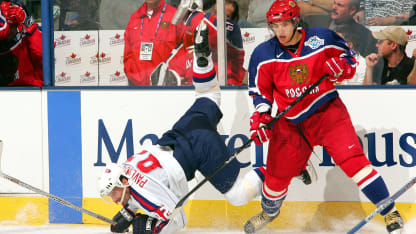
BRIAN WILLSIE
As the players started coming in from the picks that we were getting, you could see that the future was going to be bright. We were unsure about the lockout, and then when we won the lottery and got that first overall pick, the excitement picked up. We drafted Ovi and heard so much about his talent. Then the lockout happened, and I had an opportunity to go play in Portland and play with a lot of those players that George had picked up like Shaone Morrisonn, Jakub Klepis, Tomas Fleischmann, Boyd Gordon, Brian Sutherby, Steve Eminger and Brooks Laich. There was an assortment of players there that they were going to build around, and the future was bright. It was a good thing for me to go there and play with all of those young guys and enjoy it.
III - Someday, Someway
The lockout was finally solved with a new CBA in July of 2005, and teams began scrambling to put together rosters for the upcoming 2005-06 season, the first of the salary cap era. The Caps knew they were still in the early stages of their rebuild, and they knew not much was expected of them on the ice. But they were instantly taken with their new teammate from Russia, who arrived in the DC area in the final days of his teenage years.
DAINIUS ZUBRUS
He actually lived with George McPhee for the first few weeks when he first arrived, during the training camp. I lived in Bethesda, not too far away, and I went by to pick him up for practice. And I've told this story a few times, but he wanted to go to the hockey store; I think he wanted to pick up a visor and some tape or something like that. Or laces, some shit like that. I just said, "All right man, I think you've got to forget about that part. Just worry about being a good hockey player, and everything else will be taken care of for you." But I would pick him up from George's house, and we would go skate.
NATE EWELL (Caps' director of media relations, 2005-10)
I think the one thing that stood out to me when I first met him - I had seen him in the World Juniors and sort of had this impression of the brash, overconfident to the edge of cocky, fiery, young kid who seemed almost out of control, watching it from afar. So I was a little bit cautious, I guess. But he is so disarming, personally. You get absolutely none of that feel when you meet him in person. Right away, he was friendly and outgoing. Even though he couldn't speak the language really well, he was clearly just so thrilled to be there. My first impression was so different from what I'd seen on TV in the World Juniors. That's what really struck me.
COREY MASSE (Caps' manager of media relations, 2005-07)
I didn't know anything about him before I came, because I was stuck in the American League, and that's where my mind was at. I Just knew that they had a high draft pick that they hoped was going to be what he is today. My first impression of him was that of some other people that I've met in hockey that have been pretty successful. You just kind of knew that he was going to do it. He was young. Immature, but in a playful way. Intelligent; he knew what direction he wanted to go in. And reflecting on it, he was in control from day one.
As I look back - and I've thought about it a lot - it was the best worst team ever to be on, that year. Nobody wanted to leave. I didn't want to leave. If you were going to pick a last place team in the history of the NHL to be on, that's the one you wanted to be a part of. I remember sitting in a hotel room in Montreal with a player, who I won't name. He was upset, because he didn't want to take a huge pay cut, but he also didn't want to leave. Some of the guys on that team that were just role players were caught in this dynamic of, "I don't want to leave, but I want to get paid. I want another contract, but do I want to take a pay cut to play for the worst team in the NHL?" It was the best last place team ever.
BRIAN WILLSIE
Starting in the '05-06 season, we had heard lots and read a lot about this talent, and then he was - with him coming over a year later and with a late birthday - a 20-year-old rookie. I think our expectations were tempered. We didn't really realize what we were going to get; we knew we were going to get a talent, but when he comes in and starts putting guys through the boards and scoring goals and generating that excitement, I think it got fast tracked a little bit.
Seeing how physical he was in his first game and scoring [two goals], we were like, "Okay, this guy is more than just a talented Russian." Before that, you thought of a talented Russian as guys like [Sergei] Fedorov and all those guys on the Red Wings, or [Pavel] Bure, but Ovi was a different animal altogether. He had the physical dimension, the excitement, the passion, that boyhood love for the game, and it caught on.
It was a team that wasn't expected to do well, and we were near the bottom, but we had this kid that fast tracked the excitement. It was pretty cool to go for that ride, after having some expectations at the start of '03-04, to going down in the pits and getting him, and then seeing it rise again, and seeing the fans come back. Attendance was not great, and it was not an exciting place to play. It was a quiet building. And to see the ways it started to change in those two seasons, it was pretty neat for me to see from a distance after I left.
STEVE EMINGER
Coming into it, my first two years in the NHL, I went from being on a team with some legendary names on it, to trading all of them for draft picks and young guys. But it was kind of exciting as well for me and some of the other young guys, that the team was going to be in a rebuild stage and we could potentially be part of it. So it was also a good opportunity as well.
TED LEONSIS
One other thing I really remember was his first practice, and Olie was our big star then. At the end of the practice, Olie was on his way to the parking lot, and I said, "Hey, what did you think of practice today, and how did Alex look? And Olie said, "That's the greatest player I've ever played against. I have faced a thousand talented guys, but I have never faced a shot like that. It's like nothing I've ever faced, and he is going to be the greatest goal scorer I've ever seen." Half of it was I'm sure hyperbole, but he knew. Players can't fool players. He knew there was something different about the way he shoots the puck and the velocity, the movement, and the heaviness. You could close your eyes, and his shot just sounds different than anyone else's shot. So Olie knew.
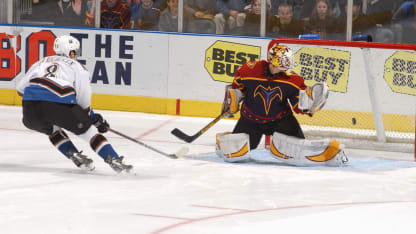
OLIE KOLZIG
I just said, "Oh my God, please don't hit me in the wrong spot." That thing was so fast and so heavy. And to his credit, he laid off at times and I think he knew how powerful his shot was. But at the same time, I think he wanted to impress everybody, especially the starting goaltender on his team, and show that he was a special player with special gifts.
That first year was fun. Him and I joked around a little, and we had little practice competitions. I remember one game where we had a shootout, and he didn't score in the shootout, and we ended up losing the game. And the next day at practice, we had a shootout at the end of practice just to work on some things. He ended up scoring, and he was chirping me. I kind of mockingly chased him down the ice and said, "Why didn't you do that last night?" So we had a lot of fun together and a lot of good competition in practice. But whenever we were working on the power play and he was setting up for that one-timer, I just always hoped that A) he would take a little something off of it, or B) that he would miss the net. Because when the puck hit you, you felt it.
DAINIUS ZUBRUS
Obviously all these years later, everybody has seen his shot a thousand times. It almost looks like he is trying to shoot through people. He shoots hard and quick, and he snaps it as good as anybody ever, probably. But it's not just that. If you look at his first game, I think it was his first shift where he actually ran somebody over and knocked the glass out. I remember that. I've seen talented guys come in and try to pick their spots or find a hole or whatever. He wasn't that. He was not that at all.
Every time he stepped on the ice, he was going to do something. I loved that. Never mind his ability to score, never mind his ability to make a play or open up a play and make things happen, but he had this big physical attitude and presence. You didn't see that from too many guys. I don't want to label Europeans or anything like that. It's not about that. But guys coming over from Europe, they don't take a run at somebody on their first shift in the league and put them through the glass. You know what I mean? Especially when it's a guy who is as talented and as highly skilled as him. So when I saw that, I'm like, "Okay. This guy is a little bit of a different breed."
STEVE EMINGER
Personally with Ovi, I clicked with him right away. And most of the guys who were within my circle clicked with him right away, too. Most younger European guys coming over here for the first time tend to kind of keep to themselves or stick with their countrymen, which is normal. But Ovi was different. He wanted to learn English, he wanted to speak English, he wanted to be one of the guys and to go out with the guys, and he always brought that attitude to the rink, that laughing and happy attitude that everyone sees. He was different in that way from the get go, wanting to be North American right off the bat.
DICK PATRICK
Ovi was a star from his first shift in the National Hockey League when, as I'm sure you remember, he broke the glass hitting a guy, and they had to stop the game. The rest of the assets really were picks or prospects that were in juniors or the minors and were working their way up. It was tough those first two years. You'd go to the games at the beginning of the year, and you just knew you didn't measure up compared to the other teams like the Wings and the playoff caliber teams. I had never felt that way before, going into a season. And I remember thinking, "Well, we made our bed, let's hope we made the right decisions with these players," but it turned out very well. Of course Ovi and then Nick a few years later; they continue to be the mainstays of the team.
OLIE KOLZIG
I didn't know much about him as a person, I had just heard about him as a player and how special he was. My first interaction with him was at that exhibition game in Cologne and my first impression was, "This kid is great." And when he first came over to North America for that first training camp he was every bit the same kid, but maybe even more impressive because he was going out of his way and was willing to learn the English language as quickly as he could.
He wanted to room with a North American guy, so he ended up rooming with Brian Willsie. He really embraced the team and really involved himself. He wasn't standoffish, he didn't do things on his own, he wanted to be enveloped by the team and be part of the team right away. And I think everybody - to a man - just embraced him because of his outgoing nature and just wanting to get involved right away, which isn't typical for a Russian or an ex-Eastern bloc country player to be that way. They tend to be a little bit standoffish, and maybe not as trusting right away. But that wasn't the case with Ovi. He bought in right away.
ALEX OVECHKIN
I knew I wanted to stay here long enough to play well. Obviously, back then I didn't know if I was going to be good, or if I was going to be healthy, or if I was going to sign that contract. But I wanted to learn for the future, right? Because you never know what's going to happen tomorrow. So I was all in for language, I was all in for showing who I am as a person, and I think the guys and all the organization appreciated it. I was all the time honest; if I didn't like something, I'm going to tell it to the coach or to the team. But it was hard for me to take that step to be who I am right now.
But as soon as you came to the league, as soon as you came to a different country, it was hard. I was talking to one guy, and he wasn't playing. And he said, "Well, maybe I'm going to [play in] Europe, but it's going to be so hard for me. What am I going to do there? It's going to be a different world." Can you imagine when we have parents, we have friends, we have everything in Russia? It's basically the same way. It's hard for everybody to change their world or change their life, to come to a different country and stay here.
DAINIUS ZUBRUS
It was his attitude to want to learn. I mean, he knew some English. I want to say maybe his parents wanted him to learn somehow, but his English was somewhat okay to get by a little bit. But like I said, he was a different breed. When he came in, he wanted to understand the jokes in the locker room, he wanted to incorporate better in the room and feel better as a person in the whole system of hockey life. He said himself, "I want to room with a North American guy and I want to speak more English and be forced to do that." Some guys, listen, the team says "Here is the teacher, here are the lessons," and the team pays for it, and the guys don't even bother to show up. This guy was the exact opposite. He said, "Zubie, I don't want to room with you." In his second season we roomed together, traveling. But in the beginning, he said, "No, I want to live with a North American guy because I want to learn English better."
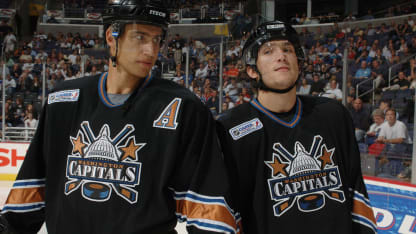
BRIAN WILLSIE
[Caps coach] Glen Hanlon came in, and he was talking to myself and Jeff Halpern - we were both there - and Dainius Zubrus. He was kind of small talking with us at Piney Orchard, and he had mentioned that Ovi wanted to have a North American roommate. He didn't want to have the crutch of being able to speak Russian to Zubie. So Jeff and I talked about it, and I said, "Yeah, I'll do it, that'll be great." First trip, we roomed together, and we stayed together the rest of the year. I played all 82 games that year, and he played all but one, so we never missed a trip together. But it started with a casual conversation with Glen Hanlon, Dainius Zubrus, Jeff Halpern and myself, and I volunteered, said I'd like to do it, and that's how it started.
ALEX OVECHKIN
I don't know how many times he didn't understand what I wanted, or we watched movies and he had to explain, or how many times I came [back] to the room after a party. He had patience, obviously. But he knows, "I have to help that kid to grow up." He taught me how to put a tie on myself and all of the small details. I will never forget my first year and my first-year teammates. We knew we were going to build something special. Obviously, we wanted to win earlier, but it tastes much better when finally you get this.
BRIAN WILLSIE
One thing that was pretty cool was, we would get to cities, and he was such a curious - almost like a boy to me. And I wasn't that much older. He was so excited about every place we went, and he asked questions about the city and the building, and what the crowd was going to be like, and "Are we walking there, or are we taking the bus?" Or like, "Are we going to Starbucks before?" It was just all these questions, and it really brought the love back for me. I mean, I loved playing and I loved everything about it, but it was really cool to be a part of that.
One quick story: We were in Toronto, and it was our first time playing there. We had our morning skate, and we came back to the hotel for [team] lunch. Then we went back to our room, and I thought we were going to nap like we always would. And he was like, "I'm going to go for a walk." And I said, "Okay," and he says, "I'll be back at 4," and it's 1:30. So he left, and it was November or December or something, and he just walked the streets of Toronto and soaked up the excitement of it. And he came back, and he was just so fired up about the city and the Leafs and how excited he was to play up there. He probably had a goal or two in that game; if I remember he seemed to score there all the time. But it was just that excitement of each night and each building we were going to, and he couldn't get enough of it. It really brought the excitement back, and it was infectious throughout the whole team just watching this kid and how excited he was to play.
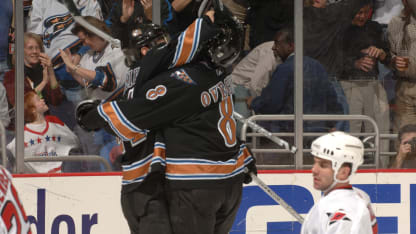
STEVE EMINGER
Right from game one, guys fed off his enthusiasm even though he was a rookie. He scored a couple of goals in that first game, I think it was against Columbus, and he ran a guy through the glass. Guys already looked up to the way he played and come to the rink every day. He was not so much a leader in the dressing room at that point, but just a leader on the ice with the way he played every shift.
COREY MASSE
One way or another, he was going to get there. Looking back at what he has done and how he has done it, he came [to North America] and he brought his whole family with him. His process of acculturation is the reason why it worked. When I think about him, a Russian player, with the knock that European players have in the NHL - you know, don't draft them, you can't win with them, and so on. But he knew he wanted to win the Stanley Cup and play in the NHL, like a lot of other European-born players. But he came here, he was well received, and he received well, right?
He was still Russian, but he wanted to immerse himself into the customs of our country. He embraced it, and that's important. He did it right. He knew what he was doing, and he wasn't going to back down from it. He was going to make it work, and he did it as a Russian-born player in our nation's capital. People loved him, and he loved being here. He knew the steps to take. He brought his family here, and he was doing everything he could to dig in. He said, "I'm going to fit in no matter what, and I'm going to win. I'm going to make it work."
I don't know how many other players in his situation came here with that mindset. Everybody was here, everybody was comfortable, and that was a huge component. You eliminate that component early, I mean, there is probably a long list of players that went back to the KHL. Now he is a different player, because he is an elite, generational talent. But even in the Boston organization when I was in the ECHL, we had a handful of guys that were gone. They probably felt like they weren't cared about or well received, did a couple of years and they were gone. "I'm going to go back to my country and make my money."
Midway through that first season, the Caps hit a rough patch, losing their first six games of calendar 2006. But a three-game road trip to Dallas, Anaheim and Phoenix in the middle of that season put a different paint job on everything. Ovechkin scored his first career hat trick in Anaheim, and after the Caps had their rookie party in Phoenix that weekend, he scored "The Goal" against the Coyotes.
STEVE EMINGER
I was watching that in the dressing room, getting treatment. I remember seeing it and then even after you watched it again, you were like, "Did that just really happen?" I don't know how that's possible. I don't know how anyone would think to do that. Some people would say it's lucky but knowing the way he plays and what he does, no, it's not. He did that. He meant to do that.
COREY MASSE
I remember a lot of things about that day. We were on a five- or six-game losing streak. We lost to Chicago at home, and we went to Dallas. We lost 4-1 there, and he scored the only goal. When you're around long enough, you know when the wheels are coming off. So we had five or six losses, maybe a shootout or overtime loss in there, and we're not getting points. We knew it was going to be a tough year. But you lose five or six in a row and now you head out on the road for three or four, and we got our ass kicked [in Dallas].
I know I was saying to myself, "Okay, something is going to have to happen here, or this is going to get ugly really fast." Not a 10-game winning streak, just something [good]. And lo and behold, the Anaheim game. He scores a hat trick, he hits his shots, runs people over, and we win the game. Then we fly to Phoenix, they have their rookie party, their bonding time, a weekend off. And then he scores "The Goal" in Phoenix, and they win. Then we came home, and they beat St. Louis. And in that St. Louis game is that highlight that you see on every early video of him turning Eric Weinrich inside out and roofing the puck.
And now he's got like 12 goals in 15 games [15 goals in 14 games, actually] or something ridiculous like that. He had a goal a game and was over a point a game player over a stretch of 15 games or something like that. That turned things around, and now everybody was feeling better again.
And that was him. The Anaheim game, that was all him. The Phoenix game, the goal was cool. That was pretty cool. And you know what? The fun was back. I was in the room after the game, and I don't remember who it was specifically, but I know that I was ordered to tell Ben Clymer he wasn't getting the assist that he thought he was getting, and to make him believe it so he'd get mad. Just to bust balls. So in one game, two games, it's like "All right, the fun is back. This is great."
OLIE KOLZIG
We lost in Dallas, went into Anaheim and won, we went into Phoenix and he scored the best goal he has ever scored. That goal in Phoenix, when you've got Wayne Gretzky sitting behind the bench going, "Wow," you know you did something special. The guy knows where the puck is all of the time. I mean, he is on his back, he's got his stick over his head, and he still manages to sweep the puck. It's just incredible the things he can do with that puck.
That was a good time for us to bond as a team. You know that rookie dinners always seem to bring the group tighter together. We really had a lot of fun on that Phoenix trip. I remember Glen Hanlon coming in before the game and saying, "Okay boys, I allowed you to do this and I allowed you to do that, but you've got to give me some bullets in my gun."
And the guys just went out and they played unbelievable. They played guilty, and they played hard, and the result was a big win. It probably was a turning point as far as that season, but also in the rebuilding of our franchise. That's when we started to become the franchise that we eventually became, not only two years ago when we won the Cup, but long before that when we were winning Presidents' Trophies and blowing the league away.
STEVE EMINGER
He earned it, he deserved it, and he was the hardest working guy - game in and game out. He deserved everything. He never had any air or arrogance about him, he wasn't cocky about it. He just played his game, and he was a guy that truly loved the game. He loved playing, loved practice, loved scoring. I haven't played with too many guys that loved scoring as much as he did. And it was just infectious. He would bring it throughout the whole team. Guys always wanted to be around him off the ice and it translated to on the ice as well.
ALEX OVECHKIN
My first year, I had the best memories from my teammates, because of the locker room and the atmosphere. We knew we weren't going to make the playoffs after probably six games. But we enjoyed to come to the rink and practice, and we enjoyed to stay together because the organization was building up something good.
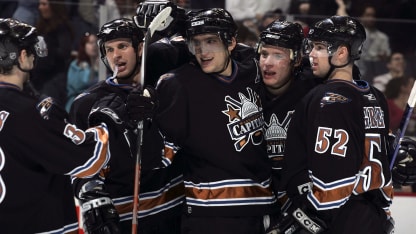
My first year was something special. Everybody treated me unbelievable - the owner, George, the coaching staff, and especially the players. Everybody tried to take me to dinner and show me the culture. All of the guys who were there the first year, they did an unbelievable job to treat me like a friend and like a brother. You know, it's funny. You get a loss, and you can see the guys get pissed. All of the crashing the sticks and [guys] getting mad because he knows his age is going up and he wants to win the game, and he wants to win the Cup. But as soon as we go on the bus or go on the plane, everybody just started joking around again, like [Matt Bradley] and [Brian Sutherby], and [Jeff Halpern]. It was an unbelievable atmosphere.
Sometimes you come to the rink and you see the guys, and they are kind of jealous to you, or mad about something - maybe they didn't play well - but back then everything was perfect. Everybody was smiling, everybody was making jokes. Everybody was on the same page, even though we were last in the league. But those memories are going to stay forever. It doesn't matter how bad you are in the standings, you have to be together and stay close together as a group.
OLIE KOLZIG
There was some hope. And that was the biggest thing. With that '03-04 team, you just saw the bottom falling out, and you just didn't know when the elevator was going to crash on its way down. But the '05-06 team, even though we still weren't a very competitive team, you knew that this kid could singlehandedly turn things around, and he did. The excitement that he brought, his exuberance and his celebrations when he scored - it was infectious to the rest of us as a group. We knew we were going to have our struggles that year, but at least we knew we were on our way up again, so it was a little more tolerable. We did have a lot of young guys in the lineup, but we also had a lot of great guys. We had Chris Clark, Jeff Halpern, Brent Johnson was there - it was a good, tight group. And had we not had the group that we had, that year would have been tough, too. But we had a good group and we had this exciting young player, and you could just see that the organization's fortunes were going to turn around. We didn't know when, but it was a fun year despite not winning a ton.
DAINIUS ZUBRUS
If you look at that year, I don't know the numbers, but his percentage of the overall offense of the team, and how much he had to do with the offense of that team, I said it then, but he should have been nominated for the Hart [Trophy] then. That's how scary that season was. He was changing the game then. He would grab the puck and make something happen out of nothing, really. I said it then; I know he was nominated for the Calder and I knew he would win it, but he should have been nominated for the Hart as well. If you look at how good a season he had - forget that he was a rookie - just look at how big of a part he played in the offense of the team he was on. [Ovechkin totaled 106 points on 230 team goals, and he finished sixth in Hart voting.]
NATE EWELL
He was enthusiastic to everything and wouldn't say no to anybody. And in fact, that first year he would get so busy doing everything that anybody asked him that it was amazing he still had the energy to play the way he did on the ice. By the end of that first year, George realized that, "Hey, we've got to get a little bit of a handle on requests for this guy's time, because there is just too much and he won't say no to any of it." To George's credit, he said, "Hey, we need somebody to step up and take control of that and make sure that Ovi is not getting stretched too thin, because he is not going to say no to anybody."
OLIE KOLZIG
We had a really good veteran leadership group to kind of make it tolerable. We probably did some things that weren't typical of teams just so that we wouldn't get so down throughout the season. I was approached to see if I wanted to be traded, and I didn't. I was really optimistic about the future. We were obviously going to have another high draft pick that summer - which turned out to be Nicky - and so now, all of a sudden, we started to have some legit pieces in place. Even though I thought he was probably the guy that utilized his talents the least, we had Alex Semin. All of a sudden, we had some offensive firepower, and so I was really, really looking forward to the future.
In June of 2006, after the conclusion of Ovechkin's rookie season, the NHL Awards show was held in Vancouver, site of the 2006 NHL Entry Draft. Ovechkin won the Calder Trophy, Kolzig won the King Clancy Memorial Trophy, and Ovechkin stepped on stage to announce the Caps' first pick (fourth overall) in that 2006 draft, Nicklas Backstrom.
NATE EWELL
That was pretty cool. The way that the awards played out that year - being in the same city as the draft - couldn't have been scripted any better. And certainly now as you look back to see what he and Nicky have done together, it was just such a perfect fit having him at the draft table. And again, I think that was George's idea as well, but we were lucky to have him in town. I remember him being nervous before the awards. I said, "You don't have to give too much of a speech, it's nothing to be nervous about." And he was like, "No, I don't know if I'm going to win." And I said, "No, you don't need to worry about that." That was pretty much set in stone at that point. I think it was a relief for him to win that. I think it meant a lot to him. There had been a lot of pressure on him all year, and I do think that was pretty meaningful.
ALEX OVECHKIN
Obviously it was a special moment to win the Calder, because it was a big battle between me and Crosby. I had more points than him, but I felt like, "He is Canadian, and he is probably going to win it." We went there just for fun. Of course my family was there and my agent was there, and I was like, "Whatever. Whatever happens, happens."
And when I won it, I didn't even prepare my speech because I was a hundred percent sure Sid was going to get it. And I was shocked. As soon as I won it, I was shocked. I was like, "Holy moly, what do I have to say?" My speech was tremendous, I think. And Olie won, and we drafted Nicky.
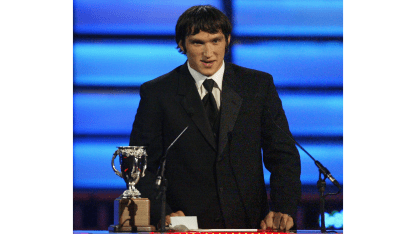
As soon as you look back and remember all of the moments we have had together, we have had ups and downs. We have had good nights, we have bad nights. We have good days, bad days. But it doesn't matter what happened, we always kind of look back because we knew it's me and him that was going to carry this team until the moment when we won. That was something special, because basically we built this franchise. I was first guy who came into the league, and he was second. This is my 15th [season] and him the same. It's crazy how times fly, but that's something special that me and him are still here together. Of course, different guys have come in and lots of talent has come into the league and to the team, but it's not the same. Me and him came to the team when it was rebuilding. They built a new organization, a new franchise, and it's something special.
OLIE KOLZIG
That was a fun weekend in Vancouver. He was sitting right across from me, and his mom was there, and his dad was there. They announced his name, and I'm sure a lot of the Canadian fans were disappointed, but he was just so excited and exuberant. He came over and hugged everybody; he hugged me and hugged my wife. That was just the cherry on top for his season, and the beginning of many more awards to come his way.
IV - Days Of High Cotton
After another struggle of a season in 2006-07, the Caps won their first three games of the 2007-08 season, with their 19-year-old rookie center Nicklas Backstrom now in the lineup with Ovechkin, but not yet on the same line. There were hopes that this would be the season in which Washington returned to the playoffs, but a dreadful stretch followed. The Caps won just three of their next 18 games, and Hanlon was relieved of his duties on Thanksgiving Day of 2007, replaced by Bruce Boudreau.
In the middle of that 2007-08 season, the Caps announced that Ovechkin and the team had come to terms on a 13-year contract extension.
TED LEONSIS
I'll never forget when we had this season ticket holder event, and there was all this speculation. We did a good job of keeping it quiet, and I said, "I have good news and I have bad news. What you've been reading about Alex signing a five-year extension, it's just not true." And it was like, "Oh, he's leaving - there was already chatter: Montreal and all the Canadian teams." And then I said, "He's staying for 13 years!" and the place went nuts.
And I really do think that that gave the fans, the city, the employees permission to feel like, "Hey, we're those guys now. Someone wants to stay here." And it wasn't just anyone, this guy was an MVP, he had charisma, he was the first pick in the draft. That was - I think secretly - the most meaningful thing that happened. And obviously you've got to give Alex and his mom credit. But you've got to give Dick credit too, because it was Dick's idea. It really was. And Dick, who is the traditionalist, the cheapest, the least gregarious person of all of us, and it was a very rational thought, which was: everyone is taking their great young players and giving them this second deal. And Crosby had just signed for five years. So that's what they're looking for, five years, and it will be a max [salary or AAV].
If you can believe it, I think Eric Staal was making more money. He had just signed his deal. And he was with Carolina, and they had won a Cup a couple of years earlier. And Dick said, "Well, let's tell them we'll do that, but let's sleep on it, and why don't we negotiate with him today his free agent contract?" So it was five years, and we looked at all the [unrestricted] free agents, and they were all signing seven-year deals. So we'll give you a five-year deal, and we'll do your seven-year deal. So it was 12 years, and what you get for that is the security of this long-term deal. If you get hurt or of your performance goes down, we take all of the risk. Over time, you might end up not being the highest paid player, but you'll sleep well at night. And then, Mrs. Ovechkin said, "Thirteen years, and we'll do it." But honestly, if you think about it, short of drafting him that move was really why we are where we are.
I remember we had the announcement, and Nick drove him here and was hanging out with him. And that - I think - compelled him to say, "Well, I want to be here. I'll do 10 years." And so then you have your two first-round picks - both bedrock guys - committed to the community long term.
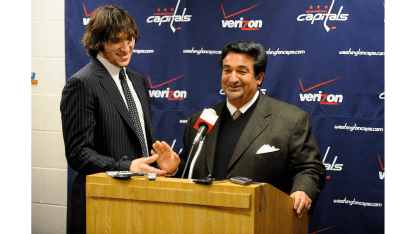
DICK PATRICK
It is one of those things that worked out well. If it didn't turn out well, you'd think, "Why on earth did we saddle ourselves with this?" But it has worked out great. At the time, he was clearly a top player in the league and worthy of being paid like a top player in the league. We had pretty much negotiated a five-year deal. But then the thinking was, "Why take a risk? Five years from now, what if the player has an unhappy experience of some sort in Washington and sees the allure of playing in Toronto or Montreal or New York, or some team like that?"
It's hard enough negotiating with a real star and making both sides happy. But we had done it, and we wanted to extend it out. I think we came back with 10 or 12 years, and he made it 13. And that happened very quickly right at the end. The negotiations took a while; there were several meetings. You might recall that Ovi had his family involved with him and we had our group. We exchanged lots of information and lots of viewpoints, and then we basically made the agreement. And then we said, "Well, let's think about it until tomorrow," and we came back and said, "Let's make it a lot longer," and they said, "Fine," and that part went very quickly. And it worked out.
NATE EWELL
The great thing with Ovi's deal, there was some question at that point, and some sense that, "Okay, could we lose this guy? Could he want to go somewhere else?" I don't know whether that is typical fan anxiety or whatever that is, but obviously that never entered his mind. I think it was such a relief to people that, "Okay, we've fallen for this guy, and now he has fallen for us too."
COREY MASSE
I remember being in Carolina with him, before a game. He is just doing his stick, and we're talking. Out of the blue, [he says], "I fired Donnie [Meehan, his agent]." That's when he changed and became his own agent. I was saying to myself, "This kid is young, but he is not fooling around." And the year after I left, he locks in with that 13-year deal. He knew from the go, "this is going to work, and this is the place where it's going to work. This is where I am going to be, and this is who I am."
ALEX OVECHKIN
Obviously, my mom didn't speak any English, right? I was talking to George, and then I was talking to Ted. Every time we have an offer, we were thinking, "Okay, should we get it or should we not?" I'm not going to give you all of the details and all of the information about it, but it was not hard, and it was not easy, especially for me because you have to deal with the GM face-to-face when you're 21, and you have to make a decision on your own.
My parents gave me the advice to kind of go for it, and do the best you can do. Obviously the relationship we had with Ted and George back then was something special. They treated me like family. I was feeling pretty good about it, and I didn't want to live anywhere [else]. I remember the rumor was Montreal, because I like to play in that place. As soon as we sat down and were talking - me, George and Ted - we figured it out right away, and the deal was signed. That was a special moment for me as well, and for my family. For the future; it was a future for me, and for my family and my kids. It was good.
With the contract taken care of, attention returned to the ice. Boudreau had been named permanent coach just after Christmas, 2007, and the Caps had started their slow but steady climb from the league's basement to their improbable Southeast Division title. They added Sergei Fedorov, Cristobal Huet and Matt Cooke at the trade deadline and then went on the run which that cemented their first playoff berth since 2003. On the final day of the regular season when they won their seventh straight game - their longest winning streak since 1992-93 - and their 15th win in the last 19 games. That 2007-08 Southeast Division title started the stretch of 10 playoff appearances in 11 seasons.
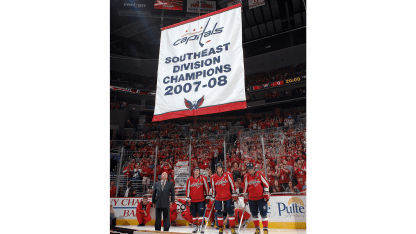
DICK PATRICK
We missed the playoffs in 2005-06 and 2006-07. Although if you look back, I think we had a good home record. So at least our fans were seeing some good hockey. But we were very transparent with the fans over what the plan was, and we weren't playing to sold out houses by any means. Many of the fans - and rightfully so - said, "Yeah, we're still Caps fans, and when you get good like you say, we'll come back." I understand that.
But that year was a struggle, and we weren't accomplishing what we thought we would in that third year, and so on Thanksgiving Day, coach Hanlon was replaced with Bruce Boudreau. The next day we played in Philadelphia, with Nick scoring in overtime on his birthday, after going from fourth line winger to maybe first line center that week. But then there was that streak toward the end of the season, when the only way we could make the playoffs would be to win our division.
And we did it on the last night or the second-to-last night of the season, after winning seven in a row and 15 out of 19, and with all that excitement, I feel like that's when the fans really completely re-engaged. They came and we were sold out that spring with all these people, and they started wearing red. And since then, they've been fully engaged and back, and we've been basically in a sellout situation and the team has gone to great heights.
NICKLAS BACKSTROM(Caps center 2007-current)
At the start of the season, I felt pretty good. I think I was on a line with [Alexander] Semin and [Michael] Nylander. I was playing right wing or left wing or something like that. I think Glen wanted me to get acclimated a little bit on the wing before he put me in the center. But at the same time, I think they realized pretty quick that I was more of a center than I was a wing.
It was a little rough stretch there for us, and we weren't really sure what kind of identity we had yet, either. The year before, they had more of an, "Ah, it doesn't matter if we lose" mentality, which I think that Bruce really changed we he came to us. He was all about winning, whatever it took. So we started to understand that mentality and we kept on striving for that.
When Bruce got here, we started enjoying the game. He switched up a couple of players' roles, and really, everyone bought into that. Everything has to do with confidence. When you have a losing streak like that, and you bring in someone new and he starts switching up the lines a little bit and giving some guys new roles, guys were ready and hungry to take the next step here. And that's what we did.
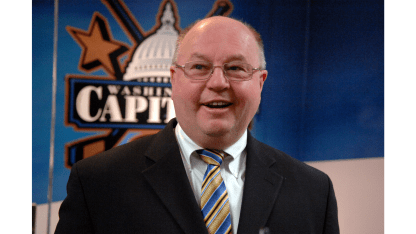
PAUL ROVNAK (Caps' manager of media relations, 2007-10)
You come in the next year, things start okay, then they don't go well. Then Glen gets it on Thanksgiving Day, they hire Bruce, they have Nick, you've got two young stars. And that's the year they traded for Fedorov. We beat Florida to win the division, and I feel like Matt Bradley had some big goals down the stretch. That was fun, right? Because you saw this group that didn't win very much for two years, and then they won the division on the last day of the season.
I remember Sergei Fedorov walking out of the locker room that night wearing his [division] championship t-shirt. I think all of the guys did. They all put them on over their dress shirts when they left after the game that night. That probably changed DC forever.
I'm in Minnesota now, right? And Minnesota is kind of looked at the way DC was; they haven't won a title in a long time. The Twins just went to the playoffs and lost. The Wolves haven't made the playoffs. The Wild have had their struggles. The Vikings went to the [NFC] championship game and got beat pretty bad by Philadelphia a couple of years ago. I kind of feel like where we are now is where DC was when I was there. We just haven't won anything.
That 2007-08 team makes the playoffs, and there is this sense of hope and optimism. There was that "Rock The Red," too, after they changed the colors from that boring black, blue and bronze and now it's red and you've got a team that's winning. I think people just started to gravitate toward the Caps. It was downtown DC. You could meet up, have a meal, go to the game, have fun and we started winning a ton of home games. That one year, I felt like we only lost five or six games at home.
ALEX OVECHKIN
That year was kind of a bizarre system. Because when Bruce came, he gave us all freedom. It was me, [Alexander] Semin, [Tomas] Fleischmann, Nicky, Greenie, I think Tom Poti was there, and Brian Pothier, too. He gave us the freedom to do everything we can on offense, because that was the only chance we could win. It doesn't matter if we were losing 4-1 or 4-0, we knew if we were going to make a push, we were going to win the games. That's basically what happened. The score was 6-5 or 6-4, or whatever crazy numbers, but we started winning, and we started believing in each other as a group.
Back then, it was my third year and everybody knew their role. Nobody was trying to say, "Okay, I'm going to do this, and you're going to do that." No one even said [anything]. Everybody just went out there to have fun, and that's what we did. And when [Fedorov] came into our locker room, it was something special for all of us. That guy is something special.
A heartbreaking weekend in early March could have derailed the Caps' late season drive for a playoff berth. On March 8 in Boston, the Caps nursed a 1-0 lead into the final minutes of the game, only to fall deep into penalty trouble and lose 2-1 on a pair of late 5-on-3 goals from the Bruins. The next day in D.C., the Caps faced archnemesis Pittsburgh, looking for their first win in more than two years against the Pens. The game was tied 2-2 in the final minute, but Backstrom inadvertently put a clearing feed into his own net with 27.9 seconds left, and Washington was saddled with consecutive regulation losses for the first time in 48 games, the longest streak of its kind in the league that season.
NICKLAS BACKSTROM
Fedorov was the one guy who called me after that game. I was showered and out of there pretty quick after that. It was obviously an accident, but I felt awful. He left me a voice mail, and he said, "In team sports, it's like this: you win together, and you lose together. It doesn't matter how it happened." I thought that was pretty cool, coming from him, and I thought we bounced back as a team pretty good. [Ed: Indeed. They won 11 of 12 to finish the season after that.] He made me feel really good, and that was really special from him right there.
After Christmas and again after the trade deadline, we were really dialed in. I feel like there were a lot of one-goal games, and there was a real good feeling in the locker room. That's what it's all about, I think. We had that good feeling, and then we got Fedorov. He was one of the best veteran guys I've ever seen. He was so professional and so good to everybody, and it was impressive for all of us young guys to watch him and learn from him. That was a big thing for us. We had a hot goalie, too, and that matters.
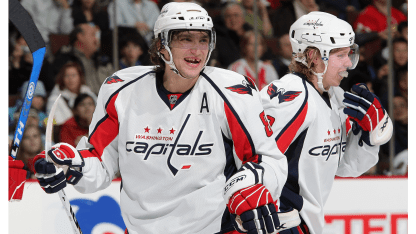
I'll say this, though. It was a fun first year, because it was like a rollercoaster. At the start of the year, some people probably thought we were going to lose again. But it was so much fun to be a part of that change to when he had six thousand people in the stands, maybe, to all of a sudden we're making a playoff push. It was almost like the Stanley Cup run; that's how much it changed with all of the guys, and with all of the people in the stands. They were fired up, loud, everything. It was just incredible to be a part of that. We lost that first round against Philly, but I thought we played some good hockey. We just weren't there yet.
But we started something big there. We just kept building and building It's just very hard to keep that same core together. But it has to start somewhere, and to be able to go through all of those ups and downs - we had a good team but we weren't really there. But we stuck with it, and it all has to do with what we have in this locker room, as a group. When you have a great group of guys, and you have a great team connection, a team bond, I think that actually matters more than individual skills, to be honest. You need both, obviously. But when you play as a team and you play good, and everyone is buying into it like in 2018, there was no one stopping us that year.
PAUL ROVNAK
I remember when E60 came to do this story on him with Rachel Nichols. They wanted to do this story, and he had just gotten that car that looked like the Batmobile, whatever it was. And they wanted to go driving with him, because it was after he'd gotten the key to the city and the no speed limit. So they put all these cameras in the car, they go driving with him, and they do it.
Then they get back, and they go do something on the ice. This was at Kettler, and this was going for a couple hours and they come up to me and go, "Hey, we've got some bad news. None of the cameras worked." And I'm like, "{Okay, well, that's too bad for you guys." But Alex was like, "No, no, no. Let's go do it again." How many people would say, "Let's go do it again?" To me, that's the kind of guy he is. He is fun loving and everything, but they literally went out and drove around again. I'm sure they didn't go as far, but Alex knew these people were here dedicating their time and their resources to him and all he had to do was get in the car and drive. Most people I know would have been, "Ah, that's too bad. I've got to meet my brother or my parents," or something like that.
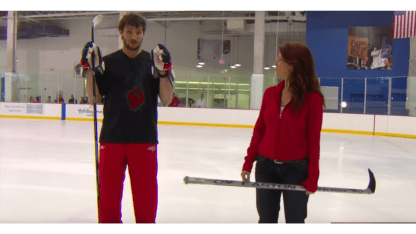
He has always had that smile, that big, gap-toothed smile. And he had the scruff before he got that endorsement deal. Just this amazing guy that I think gelled real well with both the younger guys and the older guys in the room. He loved the game, but he probably had as much fun off the ice as on the ice.
OLIE KOLZIG
It was unbelievable. I mean yes, I was going through a tough time professionally; obviously it was coming down to the end of my career. But you're still part of the group, maybe just not having as big of an influence on it. The coach got fired on Thanksgiving and Bouds comes in, and basically half the team had played for him in Hershey. Everybody was excited and everybody loved playing for Bruce. I think it really opened up Mike Green's game, because I don't think he was in real favor with Glennie at the time.
It was just a fun ride. The trade deadline was obviously an exciting time - not so much from my standpoint - and now we bring in [Cristobal] Huet and [Sergei] Fedorov, and then we had to go on some unbelievable run at the end. I played my last game in Chicago - I forget what the date was - and I think after that we ended up winning 11 in a row, maybe? [Close, it was 11 of 12.]
We had to beat Florida the last night of the season, and when that happened, we cleared the benches like we had just won the Stanley Cup. It was unbelievable, the excitement. Here we were three or four years earlier, at the bottom of the league and a laughingstock. Then we end up getting Ovi and here we are, we finally made the playoffs again. I think we should have beat Philadelphia, but we didn't; we bowed out in the first round. But just that run that we had elevated the franchise again, and there was just so much optimism going into that next year.
V - Superstar-Watcher
Of all the people we talked to for this piece, only Leonsis and Patrick have remained here in DC continuously; the rest have moved on. We wondered what it's been like for them to follow Ovechkin's exploits from afar, and what it's been like for Leonsis and Patrick to watch his evolution and growth from up close, over a period of a decade and a half.
OLIE KOLZIG
You feel a lot of pride. I felt like I was his big brother in a way. I had a little bit of influence early on in his career. It's been great seeing him mature, and seeing him grow into that letter [on his sweater]. And he just doesn't seem to be slowing down at all. That's the most impressive thing.
Usually when guys get over 30 - especially with the way that he has played - you're waiting for a little bit of a tail off. And it hasn't happened. I think just not dragging that weight around anymore of not being the best player to never win a Cup, I think it has just really ignited and rejuvenated him. And now he is within reach of this unbelievable record that Gretzky set. To have played with a guy like that, and to have maybe mentored him a little bit, and maybe had some sort of influence - it's just an awesome feeling.
And the way he and I interact now is the exact same way we interacted all those years ago in Cologne when we first met. There is not one thing that Ovi - in my eyes, to me - has changed. He is still very complimentary, he is still very respectful, he still likes to rib a little bit. That relationship that he and I have has never changed or wavered. And to see what he is doing, it's inspiring and it's incredible. There is still a long ways to go to get it, but if anybody can, he can.
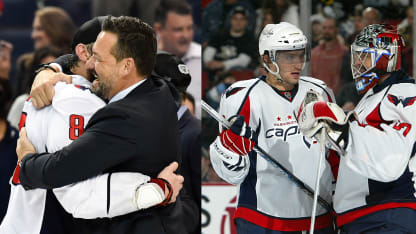
STEVE EMINGER
I was happy for him when he won the Cup. Like I said, I clicked with him from the get go, and we were good friends and spent time together in the summers, off ice, everything. It was nice to see Ovi win it, and it has been great to see him break all these records; some of these records have been around for a while. To see a current player chasing [Gretzky], it just makes it a little more intriguing. I'm definitely pulling for him to pass someone.
NATE EWELL
As I have watched him, watching him win the Cup was something really, really special. Because I know as much as all of the individual accomplishments were meaningful, the thing that drove him all of the time was winning, and I knew how much it had hurt him when they didn't win. So seeing him do that was really special.
I think seeing him do the other stuff - and the Gretzky record, if he ever gets there, that will be different because I don't think anybody ever could have predicted that. The other stuff though, it just seems like it fits and it's natural. Of course he's got every record in Caps history; he's the best player. And it was pretty clear pretty early on that he was going to be the best player if he stuck around. But like anybody who was ever around the team, seeing him win the Cup was a whole different feel from all of the individual milestones.
DAINIUS ZUBRUS
I don't look at it like I had a hand in it. The first two years, we spent a lot of time together on and off the ice. I think they had him play with Andrew Cassels in the beginning, and then we had a couple of good games together and after that it was more or less, if he is on the ice, I was on the ice. We actually killed penalties together.
We had fun on the ice for sure, and of course I have been rooting for him. It was good to see him get the Cup. Whether it's fair or not, I don't know, people are still going to view him on whether he won a Cup or not. That's going to be addressed on the great players, right? So I'm glad, because I know. There are a lot of components that go into winning, and especially the Cup. And it just wasn't working out. All of that individual stuff, I never doubted that he was going to get there and continue on doing it. But I was glad to see him get the Cup, because it's good for him. I'm happy that he did it because I think that people will remember that as much as whatever amount of goals he is going to score.
BRIAN WILLSIE
The Gretzky record, that's remarkable, just that he is even in the conversation. That's such a crazy mark. And the way he plays too, his durability is just astounding that he can keep on playing and playing as many games as he does, the way he does, and still score goals all of the time. The opposing team always knows how he is going to score goals, but he still scores goals. And the way it is now with the video, and the tactics, and the defensive responsibility, it's so different from the way it was in the '80s and '90s. That he still scores as many goals as he does is just crazy to me, just watching it as a fan, that he is still going and he could keep going and doing it is awesome to watch.
It's cool to talk about, and it is cool that I was a small part of it at the very beginning. But I think of all those things that I've watched him do as a fan, I was happiest when they won the Cup. With all of the milestones he has had, just getting that Cup - and whether he gets another one or not - but just getting that Cup was pretty cool to see, because it has a lot to do with how you're remembered, if you win or not, with all of those individual ones. Just seeing him win the Cup was pretty cool as a fan, as a friend and as a former teammate, it was a real highlight for me to see.
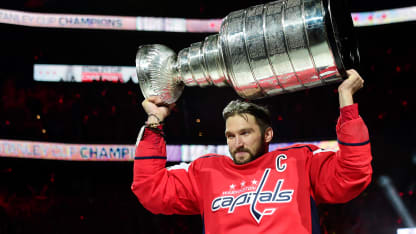
PAUL ROVNAK
You had this transcendent sports figure for the city, but it was also a transcendent figure all-time for the city. Think if he played basketball or baseball. That kind of greatness deserves to be savored, and it doesn't stick around forever.
When I look at who is there from when I was there, you've got Backstrom, you've got Carlson, you've got Holtby and you've got Ovi. And that's it. At some point, all good things come to an end, but he is somebody that changed that city. We have a player on the [U. of Minnesota] football team now that grew up in Virginia, and he grew up a Caps fan and he also played hockey. And he told me one of the reasons he played hockey was because of Ovechkin. Kids growing up around there want to be him.
Before Ovi came along, I don't know how many people were walking around with a t-shirt that had a Caps name and number on the back of it. I'm sure your hockey diehards were, but this is a guy that crossed over from hockey to mainstream. I mean, he's got a SportsCenter commercial and he is all of the media. He is a celebrity who just happens to play hockey in that city.
But you talk about playful, after they won the Cup, how great was that? This guy was swimming around in fountains, celebrating with the people. That's one of the things I thought was so cool, too. Those fans had been there for over a decade with him, and when he finally does it, when they finally get it, they partied with the whole city. That was one of the coolest things I've ever seen.
TED LEONSIS
I'm really proud of him. He has become a real, fully developed human. He has a family, he is a husband and a dad. He is still funny and charming, but he is much more mature.
DICK PATRICK
It's been remarkable. I'm just happy to have a front row seat for it. Thinking back to his first game, what did he have, a couple of goals? And he was hitting everything that moved. He was so exciting right from the start. Other than a couple of tough stretches that he has had intermittently, he's been that way every year.
Last year, he had what, 51 goals? At age 33. He has passed some amazing goal scorers, and some of them had an opportunity to play in a league that was a little more wide open too, not to take anything away from any of them on that list. Ted mentioned to me once when we were presenting him with some award for one of his milestones - maybe it was his 600th goal - and he said, 'It seems like we just did 500.' It seems to go so fast sometimes.
SAP Stats looks at Ovechkin's Richard Trophy campaign
It's really hard to score goals in this league, and he just does it all the time in every way. Some of his methods have had to change; you don't see him beating the guy 1-on-1 like he did in his early years, streaking past them to score. But he still scores 50 goals most years, so he is adaptable and he's got that great shot. And he clearly loves to score goals.
DAINIUS ZUBRUS
I hope he did get them some new fans now, especially with winning and all. But when he came in, the building was definitely not full. It was maybe two-thirds or three-quarters full, tops, on most of the nights.
But that season when they were down and they switched coaches, and they started making the whole comeback and they were able to make the playoffs, the start of that whole thing was Ovi being Ovi, and being able to do what he does, right? Even when I played, I mean, I retired a few years back, but in the years after I left you could see that the whole culture in Washington started to switch. The games were sold out or at least looked like they were sold out, and the building was loud. And it became a hockey town, it felt like it did anyway. I don't know how it is now, but I think it feels like a hockey town. You look at 15 years ago with the lockout year and the pre-lockout year, and it's so much different. It's a different atmosphere. A lot of things go into that, why these things happen the way they do, but I think Ovi is the biggest piece of the puzzle.
PAUL ROVNAK
I got chills when you asked me about watching him from afar and him winning a Cup. I've got two kids, and they were four and two at the time. So I'm watching by myself, and they win. I was sitting on the floor in my living room, and "relief" is probably a bad word. But he's got the towel around his neck, he's got gray hair, he is still this enormous figure. And when he skates up next to Gary Bettman and picks up that Cup, I've gotta be honest. I cried there by myself, because I was so happy for him.
I was there for a couple of years, and we lost Game 7 three times at home. And you see what that does to people. Man, those are long seasons. You lose Game 7 at home three years in a row, and you go into work the next day, and you're like, "Is my email working? Is my phone on?" Because everything just ends. Everything just stops, and nobody cares about you anymore. And then you have the critics saying, "He doesn't care about this, he is just going to go play in the World Championships." And man, there is nobody who cared more, and there is nobody who wanted to win more.
When he picks up that Cup, he kind of pumps it three times and he lets out that yell that everybody has seen him do, but he is under different emotions this time, and he starts skating with it. Think about what they had to do. You're down 0-2 to Columbus and you win in double overtime of Game 3. To beat Pittsburgh - to finally beat Pittsburgh - and then to have to come back from 3-2 [down] against Tampa. And then you've got to go up against a brand new team with a general manager that, oh by the way constructed a good chunk of the team you're on. I mean, it was awesome.
Just the sheer joy that you saw on his face, and again, I'm watching it on TV. But that's something that I'll never, ever, ever forget. I woke my wife up, and I was like, "The Capitals won the Cup." I'm getting emotional thinking about it now, and I've been gone almost a decade. But it was one of the coolest things I've ever seen. And I've got to be honest, it was because of him.
I often ask myself, "Am I still going to follow the team when he's not there anymore?" You know what I mean? Because you lose that connection. But it was because of him, because I saw so much of what he put into it. And then to finally get rewarded and finally have it pay off, it was fantastic. The guy got to the top of the mountain.
How good did that feel, to drink out of that Cup? You talk about a team that's been tormented, time after time after time. And now, they won the Stanley Cup. What could be better? Being away for a decade, and as a fan watching on TV, I felt that relief. Talk about magic. Like the four goals against Montreal and the pass to himself off the wall. Or the goal against Buffalo where he kinda chipped it to himself and split the [defense] and scored. For me, not growing up and being a hockey guy, I hope I appreciated it all, you know what I mean? Just how amazing he was and is. I can say, "That's incredible," but it's been unreal to continue to follow him and to see him get that Cup. And I'm sitting there crying by myself.
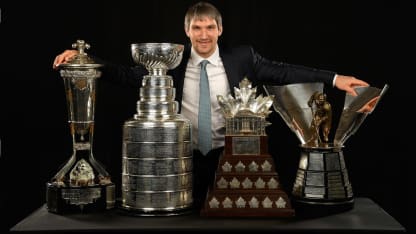
BRIAN WILLSIE
That night, I just happened to be in Vegas for something else, and I was walking through the lobby of the MGM, and I walked right into Ovi. I guess they had gone to a club, and they dropped the group off at the front door. So he had to walk from the front door to the back where the club was. And my wife and I happened to be there for something else, and we happened to be walking through the club.
And my wife said to me, "I think that's Ovi carrying the Cup." And there was a throng of people around him. She was like, "You better stop him," and I was like, "No, no, I don't want to bother him." But I did stop him, and right away he was like, "Wills, Wills!" It was a pretty cool moment that I put that connection together again, and was able to see him that night. It was so random that I ran into him in a Vegas hotel, and he is carrying the Stanley Cup.
OLIE KOLZIG
It's still so hard to put it into words. I mean, it was so surreal and I think it still is. Watching the [Cup] Final this past June and seeing St. Louis celebrate, I just put myself back at T-Mobile Arena. We had the countdown, and we had the whole staff up there, and we were just jumping around like we were little kids. And then we went down on the ice.
I still can't really put it into words. It was obviously one of the most special moments I will ever feel. But I think that really the coolest part of that whole day and that whole night was when Ovi came over. We hadn't really connected on the ice at all; he was doing his photo opps and he had his family there. He was getting ready to leave the ice with the Stanley Cup, and out of the corner of his eye he saw me, and he turned right around and skated over to me with the Cup. He said, "Can you believe we did this?" And he handed it to me. To me, that was my favorite moment of that whole run, that whole experience.
